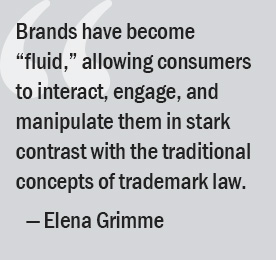INTA Weighs In on Critical Areas of Internet Policy at ICANN and the United Nations
Published: February 15, 2019
INTA recently submitted several substantive comments on policy issues that are critical to brand owners, including the proposed policy for the WHOIS domain name database administered by the Internet Corporation for Assigned Names and Numbers (ICANN), use of geographic terms in the next round of applications for new generic top-level domain names (gTLD), and how digital cooperation can be enhanced globally.
On December 21, INTA submitted comments to the Initial Report of the Expedited Policy Development Process (EPDP) on ICANN’s policy for registration directory services known as WHOIS. As INTA has reported over the past year, ICANN’s Temporary Specification (Temp Spec) for the WHOIS system severely curtails the ability for law enforcement, brand owners, and cybersecurity researchers to access domain name registration information. The Temp Spec is in response to ICANN’s interpretation of the European Union’s General Data Protection Regulation (GDPR).
 INTA’s position is that the Temp Spec is out of balance and goes well beyond what is required under GDPR. The Temp Spec has seriously hampered enforcement efforts, and while it may be protecting domain name registrants, it is harming consumers by withholding information that is critical to law enforcement and intellectual property (IP) protections.
INTA’s position is that the Temp Spec is out of balance and goes well beyond what is required under GDPR. The Temp Spec has seriously hampered enforcement efforts, and while it may be protecting domain name registrants, it is harming consumers by withholding information that is critical to law enforcement and intellectual property (IP) protections.
In its latest comments, INTA highlights the need for the correct balance and advocates for the publication of the domain name registrant’s name, organization, and email address, which are currently masked. In addition, INTA supports (1) recognizing IP rights and “legal” rights in general as legitimate purposes for data access and publication under GDPR and per ICANN’s bylaws; (2) developing a GDPR compliant access model in tandem with the EPDP; (3) recognizing dispute resolutions and using investigations as legitimate purposes for data processing in accordance with ICANN’s own by-laws; (4) distinguishing natural versus legal persons; (5) having ICANN limit geographic scope in accordance with GDPR; and (6) having billing and administrative contact data as an “optional” data point for registrants.
Although WHOIS is front and center in ICANN policy discussions, INTA is carefully monitoring other hot topics, including the development of procedures for the next round of new gTLD applications and the treatment of geographic terms to the right of the dot.On January 22, INTA submitted comments on proposed recommendations from the ICANN working group that is looking at subsequent procedures for new gTLDs. While INTA opposes restrictions on the use of any geographic terms in the new gTLD system, it recognizes the negotiated policies in the 2012 Applicant Guidebook (AGB) and accepts them as a compromise based on community discussions on the topic.
Therefore, INTA opposes any expansion of the AGB and advocates limiting as much as possible any lists of reserved names. The Association also opposes the following: recommendations that give governments preemptive rights to non-capital city names; additional levels of bureaucracy regarding letters of objection/non-objection from governmental authorities; and the protections of three-letter designations for countries, such as “USA.”
INTA supports, however, the recommendations that capital city names be protected in the official language(s) of the country in which they are located, and an “intent to use” basis in applications that intend to use geographic terms in association with governments like .nyc or .berlin, including language in the registry agreements that states that applicants will not use geographic terms that create a false impression that a name is associated with a government or region when it is not. Otherwise, there should be few limitations on registering geographic terms or terms of a regional nature. Finally, INTA supports curative rather than preventative approaches in instances in which there may be a question of whether a geographic name should be delegated.
Lastly, on January 31, INTA was pleased to submit a substantive set of comments and recommendations in response to the United Nation’s High Level Panel on Digital Cooperation (UNHLP). Chaired by Melinda Gates of the Bill & Melinda Gates Foundation and Jack Ma of Alibaba, the panel is tasked with advancing proposals to strengthen cooperation in the digital space among governments, the private sector, civil society, international organizations, academia, the technical community, and other relevant stakeholders. The UNHLP is expected to raise awareness about the transformative impact of digital technologies across society and the economy, and contribute to the broader public debate on how to ensure a safe and inclusive digital future for all, taking into account relevant human rights norms. See this article here.
 INTA’s submission focused on safety and trust, decent work and economic growth, innovation, fair competition, and secure infrastructure as the priorities for digital cooperation. The Association contends that the digital world should not unduly expose anyone to threats against their physical or economic safety. Using data from INTA’s Cost Impact Study on The Economic Impacts of Counterfeiting and Piracy, INTA supplied facts and figures to support the importance of brand protection online and to advocate for IP rights as key drivers for innovation and growth in developing economies. As noted in INTA’s submission, economic growth and sustainability are key factors underlying some of the more pressing digital issues. Recognizing IP as a driver rather than an obstacle to growth could attract more private sector involvement in policymaking in the digital space.
INTA’s submission focused on safety and trust, decent work and economic growth, innovation, fair competition, and secure infrastructure as the priorities for digital cooperation. The Association contends that the digital world should not unduly expose anyone to threats against their physical or economic safety. Using data from INTA’s Cost Impact Study on The Economic Impacts of Counterfeiting and Piracy, INTA supplied facts and figures to support the importance of brand protection online and to advocate for IP rights as key drivers for innovation and growth in developing economies. As noted in INTA’s submission, economic growth and sustainability are key factors underlying some of the more pressing digital issues. Recognizing IP as a driver rather than an obstacle to growth could attract more private sector involvement in policymaking in the digital space.
INTA recommends adding or supplementing mechanisms to better and more uniformly support trademark protection and enforcement to maximize speed of results with minimal cost and inaccuracy. Further, the Association suggests making public education about digital fraud globally accessible (in local languages and through local means) and targeted to reach everyone, including the very young, teenagers, workers, and the elderly. The messaging should be age-appropriate and broadly address digital fraud.
Although every effort has been made to verify the accuracy of items in the INTA Bulletin, readers are urged to check independently on matters of specific concern or interest.
© 2019 International Trademark Association
This website uses cookies so that we can provide you with the best user experience possible. Cookie information is stored in your browser and performs functions such as recognising you when you return to our website and helping our team to understand which sections of the website you find most interesting and useful.
To find out more please see our Cookies Policy and Privacy Policy.
These cookies are used to identify a user’s browser as the visitor goes from page to page on the Site. These are session cookies, which means that the cookie is deleted when you leave the Site. It is an integral piece of the Site software and used to let the server know which users are on the Site at any given time and make certain parts of the Site easier to use.
|
|
If you disable this cookie, we will not be able to save your preferences. This means that every time you visit this website you will need to enable or disable cookies again.
These cookies are used to collect information about how visitors use our Site. The cookies collect information in anonymous form, including the numbers of visitors to the Site, where visitors have come to the Site from, the pages they visited and how they have interacted with tools on the Site like search and embedded media players. We use the information to compile statistical reports of our users’ browsing patterns so that we can improve the Site.
|
|
Please enable Functionality Cookies first so that we can save your preferences!
These cookies are used to deliver advertising relevant to the interests of visitors to our Site. They are persistent, which means they will remain on your device after you leave the Site.
- Facebook (Ad Pixel)
- Google (Ad Pixel)
- LinkedIn (Ad Pixel)
- Quattro Anonymous
Please enable Functionality Cookies first so that we can save your preferences!
